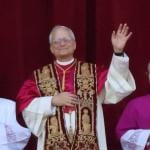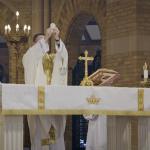The esteemed Sara Butler in First Things looks at what we know about women and the diaconate so far and reaches this conclusion:
Since the diaconate is a grade or degree of Holy Orders (The Catechism of the Catholic Church [CCC], §1554), the unity of the sacrament seems to require that its subject, who is the sacramental sign, be a baptized male. In the end, the ITC referred the question to the discernment and authoritative decision of the Magisterium.
Encouraged by this apparent openness, advocates for the admission of women to the diaconate have continued to examine the historical sources—early Church orders, ancient and medieval rites, and literary and epigraphical evidence. Many of them dispute the ITC’s finding on the lack of “equivalence” between the women’s and the men’s office. Presumably, then, the commission will take any new or neglected research into account when it revisits this and the question of whether women were ordained to the sacred ministry.
In my judgment, the evidence to date indicates that deaconesses belonged to a women’s order analogous to the male diaconate, carried out a ministry to women (in the congregation or in a monastic community), were ordained in rites similar but not identical to those for men (e.g., the typology in the prayers is either feminine or masculine), and were prohibited from the liturgical ministry at the altar entrusted to deacons. The ministry of deaconesses was sui generis; it was not included in the cursus honorum (the progression from lower to higher ministerial roles), even though deaconesses were sometimes regarded as members of the clergy. The burden of proof seems to lie with those who argue that deaconesses belonged to the same order as deacons.
In the Catholic Church, it should be noted, establishing and evaluating the historical facts is only one step in an evaluation of this topic. The properly theological question, treated in the ITC document, is the sacramentality of the diaconate itself. Deacons are ordained to the “ministry” as distinct from the “priesthood” (CCC §1569), but their office, exercised without interruption since apostolic times, has been recognized as belonging to “major orders” since the twelfth century. And the Church has always taught that the sacrament of Holy Orders is reserved to men (CCC §1577).
Photo: BBC















